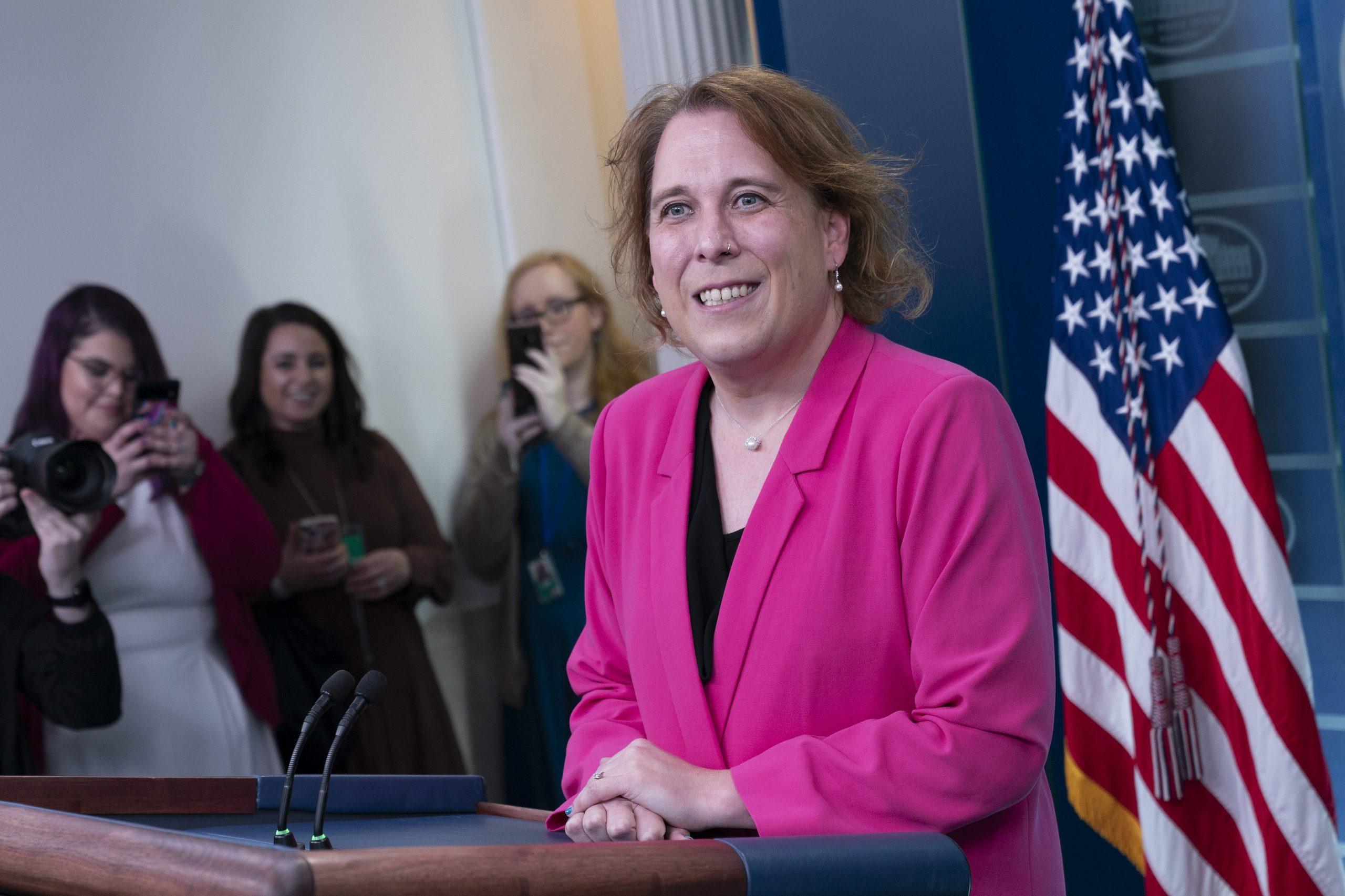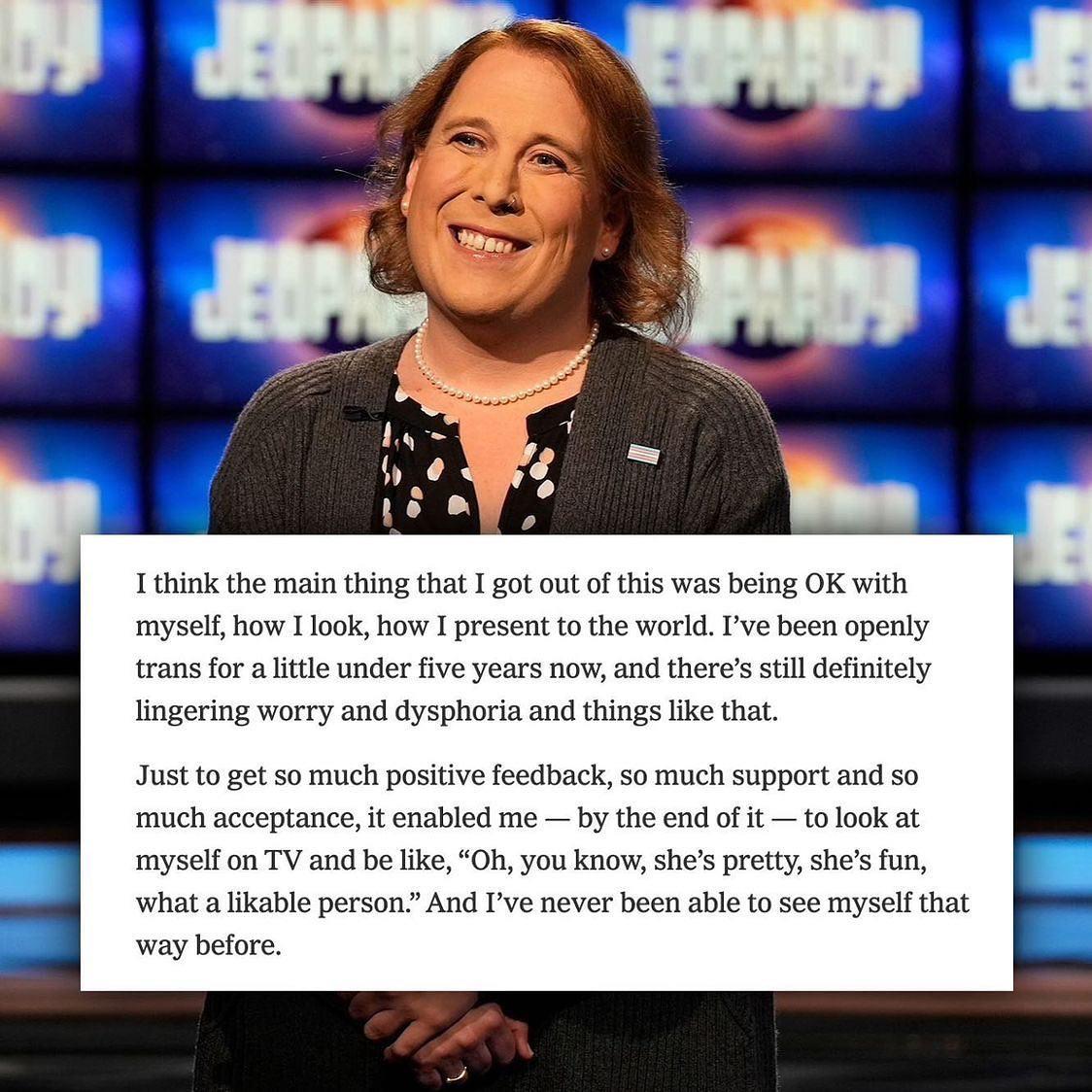Amy Schneider Pauses 'Jeopardy!' Coverage To Speak Against Anti-Trans Legislation
By Kristin Myers on November 16, 2022 at 7:35 AM EST

"Jeopardy!" fans have been looking forward to champion Amy Schneider giving her daily write-ups from each episode while competing in the annual Tournament of Champions against Andrew He and Sam Buttrey.
Unfortunately, on Tuesday night, the 40-game champ revealed she was going to have to hit the pause button on her usual "Jeopardy!" coverage in order to travel to her native state of Ohio and protest the wave of anti-trans legislation sweeping the state.
'Jeopardy!' Champ Amy Schneider Heads To Ohio To Fight 'Terrifying' Anti-Trans Legislation
Hi! So, I’ll have lots to say about tonight’s game, but unfortunately a bigger priority has intervened. A childhood friend told me about Ohio SB 454, which would have devastating consequences for trans kids, and I’m flying to Columbus in the morning to do what I can to fight it
— Amy Schneider (@Jeopardamy) November 15, 2022
On Tuesday night, the Ohio native, who is now a resident of Oakland, California, tweeted, "Hi! So, I’ll have lots to say about tonight’s game, but unfortunately, a bigger priority has intervened. A childhood friend told me about Ohio SB 454, which would have devastating consequences for trans kids, and I’m flying to Columbus in the morning to do what I can to fight it."
"I’d rather be writing about Jeopardy!" Amy admitted. "But if this bill passes, trans children in Ohio will be denied gender-affirming medical care, and that is terrifying. So please, if you want more Jeopardy content from me, ask your elected officials to just leave trans people alone."
"We’re not trying to bother anyone. We’re not a threat. We just want to, like, post-Jeopardy recaps on Twitter or whatever, same as anyone else. Thank you," she concluded.
Amy Will Speak Against The 'SAFE Act' In Ohio On Wednesday, Nov. 16

Along with her tweet, the former engineering manager attached a link to LGBTQ Nation, which featured more in-depth coverage of why Amy decided to head for Columbus immediately after hearing the news. On Wednesday, November 16, Amy will testify in the Ohio legislature only a few months after she answered questions about anti-trans legislation in the White House.
This latest legislation will “block transgender youth from accessing gender-affirming medical care and require teachers to out trans kids to their unaccepting parents,” according to LGBTQ Nation.
In a statement released by Equality Ohio, the state’s LGBTQ advocacy organization, Amy said, “It’s so important that LGBTQ+ Ohioans and those who love them fight to protect the children whose health and safety would be endangered by this misguided legislation.”
Amy Previously Spoke Out Against Anti-Trans Legislation At The White House

The bill is officially known as H.B. 454, but Ohio residents have probably heard it referred to in the news as the “Save Adolescents from Experimentation Act,” also known as the “SAFE Act.” This law, if it goes into effect, will ban the use of puberty blockers, hormones, and gender-reassignment surgeries for anyone under the age of 18.
It will also prevent individuals from using health insurance coverage or government funds for gender-affirming healthcare. Medical providers could be sued or face other disciplinary measures for providing gender-affirming healthcare, should this bill pass.
In addition, the bill says that teachers must “out” a student’s “perception that his or her gender is inconsistent with his or her sex” to the parent or legal guardian of the child if the bill goes into effect.
Ohio Is One Of Several States Considering Banning Gender-Affirming Healthcare For Minors

Although the bill claims that a “vast majority” of children “identify with their biological sex in adolescence or adulthood,” LGBTQ Nation notes that there are no peer-reviewed studies or other evidence to back up this assertion. The creators of this legislation also allege that doctors “don’t understand the long-term effects of puberty blockers.” However, these kinds of medications have been used in children who have had cancer for decades.
Although the legislation claims that “the risks of gender transition procedures far outweigh any benefit,” transgender youth spoke to The Columbus Dispatch to discuss the “frustration” both children and their parents feel regarding the new legislation.
It should be noted that there are only two other states, Arkansas and Alabama, that have passed a ban so far. However, a federal judge blocked Arkansas’s ban from going into effect and part of Alabama’s legislation has also been blocked. At least fifteen other states have introduced similar legislation, including blocking health insurance providers from funding gender-affirming healthcare.